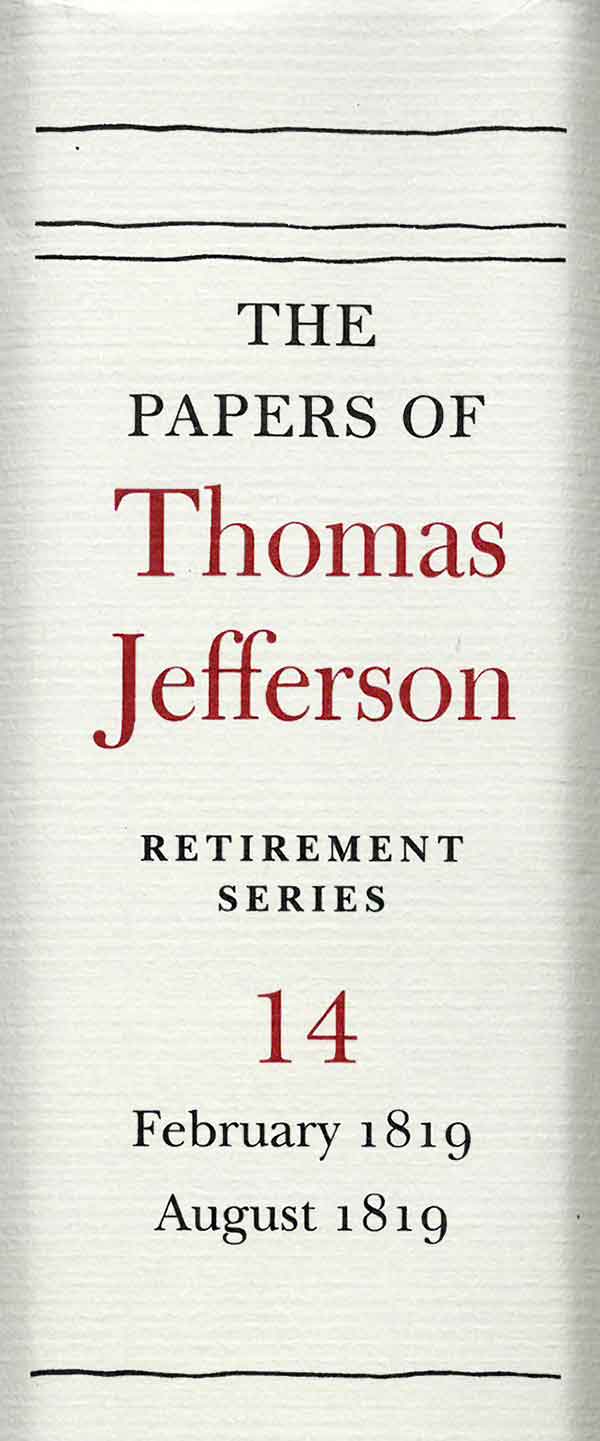 The 637 documents printed in this volume cover the period from 1 February to 31 August 1819. Named to the University of Virginia Board of Visitors on 13 February, Jefferson continued to be preoccupied with numerous facets of the infant institution. He worked closely with the successive proctors Nelson Barksdale and Arthur S. Brockenbrough to hire and oversee builders, responded to unsolicited applications for professorships, often repeating the board’s decision that all the university’s funds were initially to be spent on construction rather than hiring a faculty, and orchestrated the establishment of a classical school in Charlottesville to prepare students for entry into the university when it should finally open.
The 637 documents printed in this volume cover the period from 1 February to 31 August 1819. Named to the University of Virginia Board of Visitors on 13 February, Jefferson continued to be preoccupied with numerous facets of the infant institution. He worked closely with the successive proctors Nelson Barksdale and Arthur S. Brockenbrough to hire and oversee builders, responded to unsolicited applications for professorships, often repeating the board’s decision that all the university’s funds were initially to be spent on construction rather than hiring a faculty, and orchestrated the establishment of a classical school in Charlottesville to prepare students for entry into the university when it should finally open.
In response to a letter from the Connecticut physician Vine Utley, Jefferson detailed his daily routine and eating habits. While observing that “I live so much like other people, that I might refer to ordinary life as the history of my own,” he went on to describe his principally vegetable diet, his consumption of alcohol, his nightly sleep of from five to eight hours, his bathing his feet each morning in cold water, and his daily horseback rides. Jefferson also shared his preference for reading and study over “the drudgery of letter writing,” and indeed during this period he continued to buy books from both domestic and foreign booksellers. His friends sought his advice on what to read, and early in July he composed and sent to two of them a catalogue of the best classical editions of works in Greek and Latin.
Others continued writing to Jefferson asking for information or sharing their own research. Francis W. Gilmer requested Jefferson’s recollections of the origins of a 1779 statute; Thomas McAuley inquired into Jefferson’s involvement with a fraternity at the College of William and Mary; and Napoleon B. Coleman solicited his opinions on numerous questions related to science, philosophy, and religion. Benjamin Vaughan penned his notes on climate change during a visit to Monticello; George Blackburn shared his views on higher education; and John Brazer and Nathaniel F. Moore both sent their publications on the proper pronunciation of the Greek language, a subject that Jefferson himself discussed at length in a letter to John Adams of 21 March.
Jefferson’s role in American history remained prominent in his correspondence. In June Adams advised Jefferson of claims in the newspapers that a formal declaration of independence had been made in 1775 in Mecklenburg County, North Carolina. Jefferson dismissed the document’s authenticity, reminding Adams that, had it been genuine, they most assuredly would have heard of it during their service in Philadelphia at the Continental Congress. The events and debates leading up to the declaration of American independence were also the subject of a detailed exchange with Samuel Adams Wells, grandson of the noted Massachusetts revolutionary Samuel Adams.
Jefferson experienced a number of worrying and painful events during this period. On 1 February 1819 his grandson-in-law Charles Bankhead and his grandson Thomas Jefferson Randolph came to blows in a public affray near the Albemarle County courthouse, eliciting great concern in the family both for the recovery of the stabbed Randolph and the safety of the volatile Bankhead’s wife Ann and their children. On 9 April the North Pavilion at Monticello caught fire, and Jefferson sustained a slight injury while attending to the blaze. For his ongoing lawsuit against the Rivanna Company, he compiled extensive notes and took depositions to send to his legal counsel in Staunton. During a visit to Poplar Forest in July, Jefferson had to deal with the damage caused to his house, particularly the window glass, by a recent hailstorm that also destroyed much of his crops. There he was also greatly alarmed by the serious illness of his longtime butler, the enslaved Burwell Colbert. His granddaughter Ellen W. Randolph (Coolidge) wrote to her mother on 28 July that “I never saw any body more uneasy than Grand papa,” which she regarded as evidence of “his extraordinary value for Burwell.”
Jefferson continued to fall behind in his payments to his creditors, and he suffered greatly from the effects of the economic panic of 1819. Drought only worsened the already-poor yield from his crops. The lack of sales and shortage of cash made both paying and collecting neighborhood debts difficult. His financial problems increased exponentially when Wilson Cary Nicholas, for whom Jefferson had endorsed two bank notes of $10,000 each, found himself unable to renew his credit in the banks. The impacts of this insolvency on Jefferson’s personal finances would endure well past his own death.
Volume 14 available through:
UVA Press Rotunda (index included; subscription required)
Founders Online (index omitted; no subscription required)
COPYRIGHT NOTICE: Published by Princeton University Press and copyrighted, ©, by Princeton University Press. All rights reserved. No part of this book may be reproduced in any form by any electronic or mechanical means (including photocopying, recording, or information storage and retrieval) without permission in writing from the publisher, except for reading and browsing via the World Wide Web. Users are not permitted to mount this file on any network servers.
